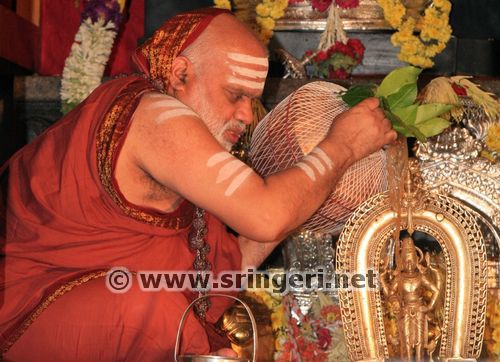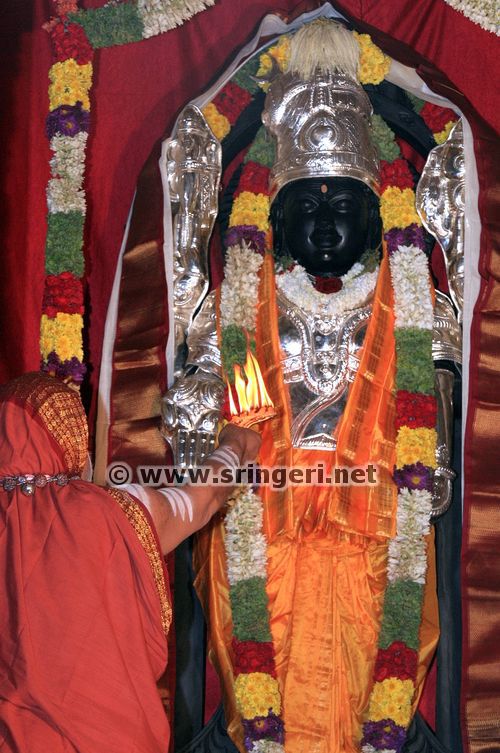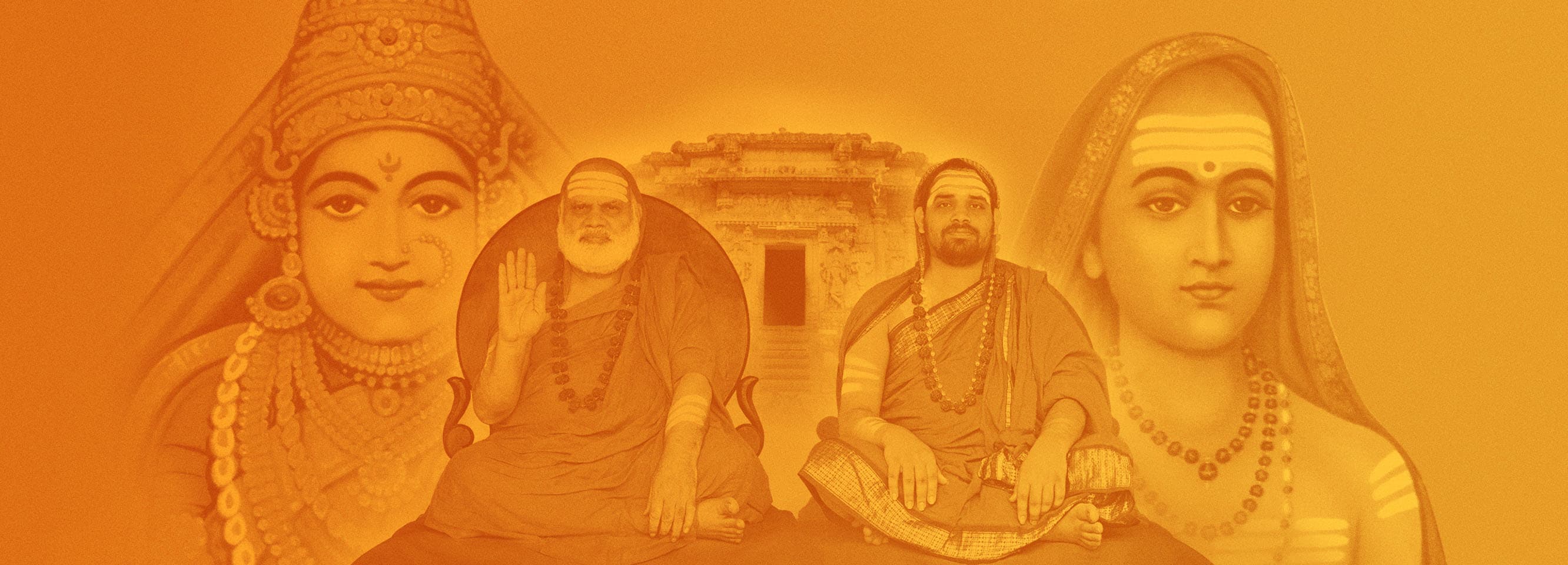On the morning of 12th December, the Jagadguru started from Karkala and arrived at the KrodaShankaranarayanaKshetram, in the Dakshina Kannada district. Temple officials and senior devotees offered Poornakumbha to welcome the Jagadguru and performed DhuliPada Puja to the Jagadguru. The Jagadguru then performed the Prathishta and Brahma Kumbhabhisheka as part of the Jeernoddharana of Sri ShankaranarayanaSwamy temple. In the evening Sabha, the Jagadguru blessed all the devotees. Devotees recalled the long association between the SringeriSharadaPeetham and the ShankaranarayanaKshetram. In His AnugrahaBhashanam, the Jagadguru said that Bharata is a land of temples. Eventhough God is beyond attributes and forms, the Shastras point out that He sports various forms and names for the welfare of devotees.
Though water is tasteless, it tastes sweet when mixed with water, and sour when it is mixed with the essence of lime. Similarly, God who transcends names and forms, appears in various names and forms out of His own power. Sporting the Trishula and Damaruka, He graces devotees as Shiva and sporting the Shankha and Chakra, He graces everyone as Vishnu. He further graces devotees as Shankaranarayana merely to indicate that these two forms of God are not distinct. Those who do not realize this fact fight over the supremacy of Vishnu over Shiva or Shiva over Vishnu. The Shastras when describing the result of sins committed in past lives, state that chronic stomach ache arises in this birth when one has committed the sin of trying to establish one form of God over the other forms.
Hence it would be foolish to argue over the relative greatness of the various forms of God. Sri Adi Shankara Bhagavatpada in His simple and lucid work, PrashnottaraRatnamalika, poses a question: “Which God must we worship?” and provides the answer as – शङ्करनारायणात्मा – Hewho is of the form of Shiva and Vishnu. This must be remembered and imbibed by everyone.
Sri AdiShankaracharya in His Bhashyam describes Bhagavan as the Controller of the Universe and is the instrument behind its creation, sustenance and annihilation. There cannot be two such Controllers. For if there were two, then one might wish that it rain now, and another wish that it not rain now. So would it rain then or not. If some say, let there be two Gods and let them have the same wish at the same time, then there is no need for a second God. Hence Bhagavan is one.
People usually accept that it is Vishnu who has taken the Avataras such as Sri Rama and Sri Krishna. That being the case, it is also imperative to understand that the same Lord appears as Vishnu and Shiva. TheShastrasstatethat anyone who keeps arguing one Avatara or form is greater than others, cannot be corrected by anyone – ज्ञानलवदुर्विदग्धंब्रह्मापिनरंनरञ्जयति.
TheJagadgurualso pointed out it is not essential to sit for long hours in Puja. Rather, even if one were to engage in Puja for only 10 minutes, doing so with full concentration and devotion reaps great benefit. That is why Bhagavan states in the Gita that whatever is offered with devotion is acceptable to Him.
Some say that we have done a lot of Puja but we have not obtained the desired results.
अश्रद्धयाहुतंदत्तंतपस्तप्तंकृतंचयत्।
असदित्युच्यतेपार्थनचतत्प्रेत्यनोइह॥
– Whatever you do without faith – be it homa, tapas, charity, or anything else – that will not bear fruit for you. Then, just because we did not get the fruits of our actions because of our lack of Shraddha, criticising the Shastras or Bhagavan, is not in the least bit right. The lack of Shraddha is evident from the fact that the result did not accrue.
The Jagadguru recounted a story where a scholar and an ordinary man used to worship the Lord everyday. While the scholar offered his prostrations by saying – विष्णवेनमः, theordinarymanwho did not know much of Sanskrit used the grammatically wrong word – विष्णायनमः – HoweverbothweregrantedSayujyaMutki at the end. The scholar was flabbergasted and questioned the Lord as to how the ordinary man also got the same result as he himself. And the Lord said it is the faith and devotion that He observes, and not the correctness of grammar – This is what is stated as –
मूर्खोवदतिविष्णायविद्वान्वदतिविष्णवे।
उभयोःसदृशंपुण्यंभावग्राहीजनार्दनः॥
We also find that when Bhagavan Sri Krishna came as a messenger of peace to the court of Dhritarashtra, He did not accept the hospitality of Duryodhana, and instead preferred to be with Vidura because of the latter’s devotion.
Some people have a doubt as to whether they will be able to be a recipient of God’s Grace. They know no mantra or shloka. They too however can be a recipient of God’s Grace provided they approach Him with deep devotion. God shows no partiality for He is beyond likes and dislikes, yet graces those who seek Him – रागादिदोषरहितंस्वजनानुरागं.
Bhagavan never expresses, “Heisdear to Me, He is not. I must bless only this person and not that person.” When we look at the Mahabharata, Bhagavata and Ramayana, we find that Bhagavan blessed even the elephant Gajendra, the child Dhruva, the queen Draupadi and the RakshasaVibhishana. What was common amongst all these was intense Bhakti.
Hence we must remember that God is one, sports various forms and must worship Him with Bhakti and Shraddha.
The Jagadguru said that the ancient ShankaranarayanaKshetram had been catering to many thousands of devotees over the years and stated that it is the good fortune of the devotees to have witnessed the Brahma Kumbhabhisheka.
The Jagadguru also remembered that He had come to Shankaranarayana and initiated the Jeernoddharana work three years back, and said it was a joyous occasion that the work had been completed and the Kumbhabhisheka performed to grace the devotees.




